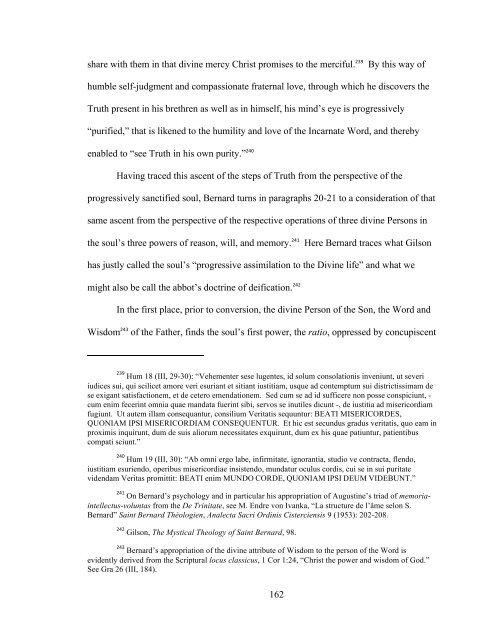MY BELOVED IS MINE AND I AM HIS: SELF-KNOWLEDGE IN THE ...
MY BELOVED IS MINE AND I AM HIS: SELF-KNOWLEDGE IN THE ...
MY BELOVED IS MINE AND I AM HIS: SELF-KNOWLEDGE IN THE ...
You also want an ePaper? Increase the reach of your titles
YUMPU automatically turns print PDFs into web optimized ePapers that Google loves.
share with them in that divine mercy Christ promises to the merciful. 239 By this way of<br />
humble self-judgment and compassionate fraternal love, through which he discovers the<br />
Truth present in his brethren as well as in himself, his mind’s eye is progressively<br />
“purified,” that is likened to the humility and love of the Incarnate Word, and thereby<br />
enabled to “see Truth in his own purity.” 240<br />
Having traced this ascent of the steps of Truth from the perspective of the<br />
progressively sanctified soul, Bernard turns in paragraphs 20-21 to a consideration of that<br />
same ascent from the perspective of the respective operations of three divine Persons in<br />
the soul’s three powers of reason, will, and memory. 241 Here Bernard traces what Gilson<br />
has justly called the soul’s “progressive assimilation to the Divine life” and what we<br />
might also be call the abbot’s doctrine of deification. 242<br />
In the first place, prior to conversion, the divine Person of the Son, the Word and<br />
Wisdom 243 of the Father, finds the soul’s first power, the ratio, oppressed by concupiscent<br />
239 Hum 18 (III, 29-30): “Vehementer sese lugentes, id solum consolationis inveniunt, ut severi<br />
iudices sui, qui scilicet amore veri esuriant et sitiant iustitiam, usque ad contemptum sui districtissimam de<br />
se exigant satisfactionem, et de cetero emendationem. Sed cum se ad id sufficere non posse conspiciunt, -<br />
cum enim fecerint omnia quae mandata fuerint sibi, servos se inutiles dicunt -, de iustitia ad misericordiam<br />
fugiunt. Ut autem illam consequantur, consilium Veritatis sequuntur: BEATI M<strong>IS</strong>ERICORDES,<br />
QUONI<strong>AM</strong> IPSI M<strong>IS</strong>ERICORDI<strong>AM</strong> CONSEQUENTUR. Et hic est secundus gradus veritatis, quo eam in<br />
proximis inquirunt, dum de suis aliorum necessitates exquirunt, dum ex his quae patiuntur, patientibus<br />
compati sciunt.”<br />
240 Hum 19 (III, 30): “Ab omni ergo labe, infirmitate, ignorantia, studio ve contracta, flendo,<br />
iustitiam esuriendo, operibus misericordiae insistendo, mundatur oculus cordis, cui se in sui puritate<br />
videndam Veritas promittit: BEATI enim MUNDO CORDE, QUONI<strong>AM</strong> IPSI DEUM VIDEBUNT.”<br />
241 On Bernard’s psychology and in particular his appropriation of Augustine’s triad of memoriaintellectus-voluntas<br />
from the De Trinitate, see M. Endre von Ivanka, “La structure de l’âme selon S.<br />
Bernard” Saint Bernard Théologien, Analecta Sacri Ordinis Cisterciensis 9 (1953): 202-208.<br />
242 Gilson, The Mystical Theology of Saint Bernard, 98.<br />
243 Bernard’s appropriation of the divine attribute of Wisdom to the person of the Word is<br />
evidently derived from the Scriptural locus classicus, 1 Cor 1:24, “Christ the power and wisdom of God.”<br />
See Gra 26 (III, 184).<br />
162
















